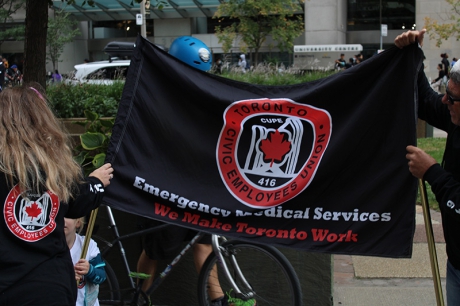Reports
You are here
#StatusCodeRed - Toronto paramedics fight underfunding

June 12, 2023
Toronto paramedic services are suffering from a lack of staff and lack of ambulances, and it is dramatically affecting services and putting residents at risk. CUPE Local 416, the union representing paramedics in Toronto has launched a campaign called #Status Code Red to raise awareness of this urgent situation, the effect it has on paramedic response times in the city, and working conditions for their members. The goal of this campaign is to increase hiring of paramedics within the service, and to increase the number of ambulances as current resources are stretched too thin.
Twenty years ago, the Toronto Paramedic Services was considered to be a leader in paramedic services in North America. At that time, the capacity of the TPS was such that it could manage day to day emergencies and still have the capacity to handle a major event. Currently, while Toronto paramedics represent the largest municipal paramedic service in Canada, with close to 1400 members, the service is understaffed to the extent that it is a struggle to manage day to day capacity. This is resulting in gaps in service where an ambulance is simply not available when needed. Status Code Red is an expression used within the service to identify such a situation, which results in delays to emergency response times and puts patient lives at risk. In 2022, there was an average of 5 hours and 36 minutes per day where fewer than 10%, or 5 ambulances were available. In 2017, there were a total of 36 code red incidents in Toronto, but this rate has been steadily rising since that time, and in 2022 there were 2492 incidents. Over this period, response time has decreased while medical emergencies requiring EMS services has increased by approximately 4% per year.
Staffing the TPS remains a challenge. For 10 years, there was a hiring freeze, where the City of Toronto only replaced paramedics by attrition and did not hire additional paramedics to increase numbers. This left the service short-staffed as the need increased. Currently, the service needs new ambulances and a significant number of paramedics to keep up with demand. In 2019, the City committed to hiring 60 new staff per year in this area until 2024, but due to unprecedented rapid attrition, this is still not enough, and it is difficult to find new paramedics due to the particularly tough working conditions created by inadequate staffing numbers. As the time frame nears an end for this hiring initiative, the service is barely breaking even. High numbers of Toronto paramedics are resigning, either to take jobs elsewhere, or to quit the profession altogether. Those who are leaving are finding work outside of Toronto, with higher rates of pay, shorter commutes and working conditions that are less stressful. Others are leaving the profession entirely due to the high stress of the work.
How stressful is this work? The workload for Toronto paramedics has steadily increased where workers are working their shifts without downtime or scheduled breaks, and with a 30% increase in overtime. In a line of work where workers witness traumatic events every day, this has led to an increase of injuries on the job, 2368 in 2022 compared to 1357 in 2017. Most of these injuries are psychological in nature. There has been an increase of 26% of occupational stress injuries over the past year alone, and a fourfold increase since 2017. Assaults on paramedics has doubled since 2017.
Currently, Toronto needs 27 new ambulances and approximately 100 additional paramedics in order to maintain an adequate level of service.
As part of their campaign, CUPE 416 and their members, Toronto paramedics, are asking Torontonians to contact their local councillor to request more staffing, and they are requesting that people share the #StatusCodeRed social media campaign as widely as possibly on Facebook at @StatusCodeRed, on Twitter at @416TPSUnit, and via Instagram at @StatusCodeRed.
Section:









